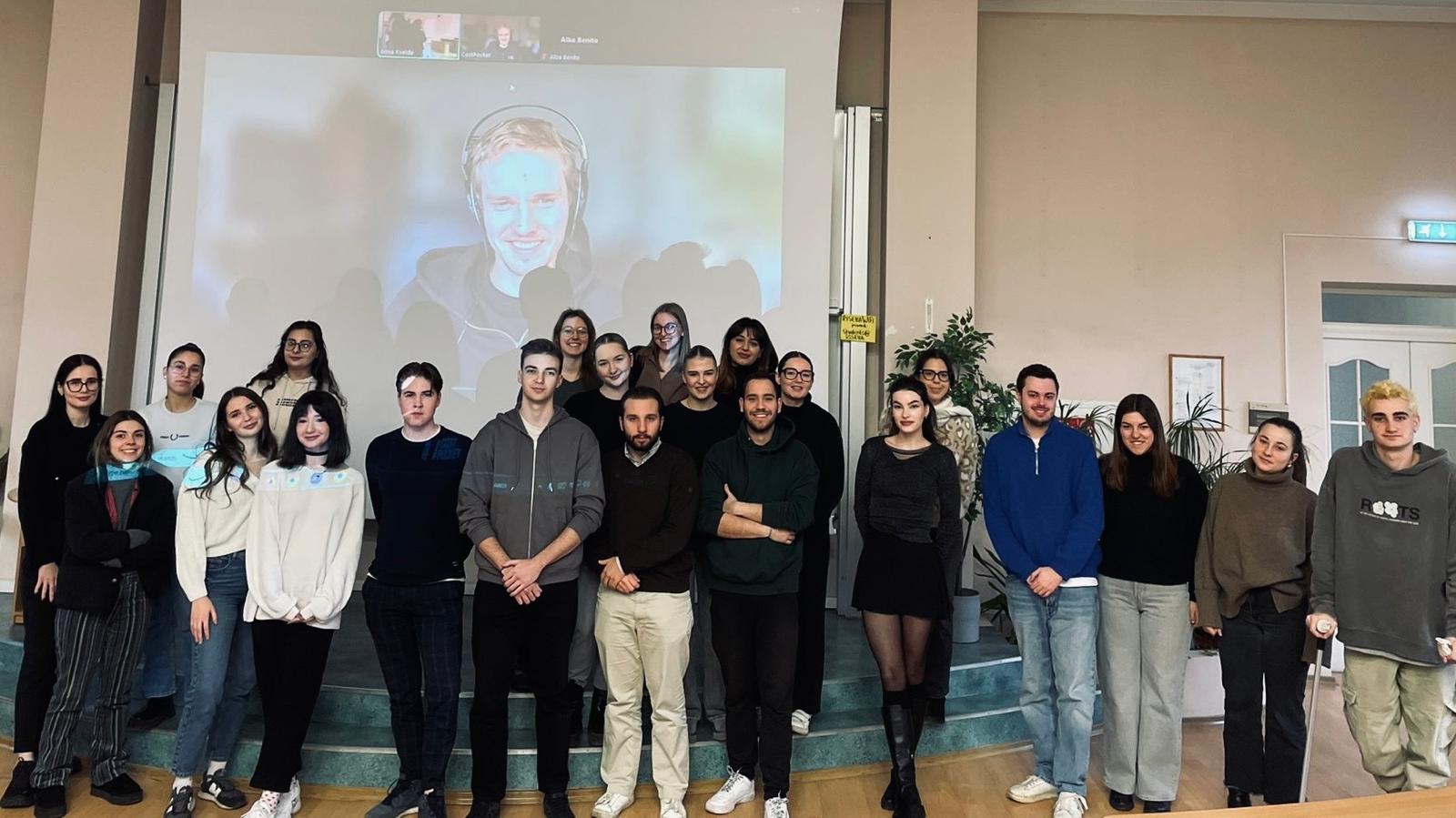Design Thinking Workshop in European Business Studies – “Development of Social Entrepreneurship Ideas”

In January 2025, as part of the Professional Bachelor’s program “European Business Studies,” an intensive practical course titled “Design Thinking Workshop” took place, during which international student teams developed several social entrepreneurship initiatives. Students from six European countries participated: Latvia, France, Spain, Portugal, Austria, and Germany.
Design thinking is more than just a trendy term – it is an effective methodology for solving complex social issues. Design thinking is fundamentally a society-driven approach that emphasizes empathy, creativity, and the problem-solving process.
During the workshop, students had the opportunity to meet Ulvis Noviks, founder and manager of the NGO “Tavi draugi,” Monta Vecozole, project manager, and Zane Priedīte, manager of the charity shop, who shared their experience of founding the organization, from the initiative to becoming the most recognized charity organization in Latvia, which received the “Riga Citizen of the Year” award from the Riga City Council in 2022.
Kaspars Gaļimovs, a RISEBA graduate, mentor, and the manager of the startup CostPocket in Latvia, shared his experience on how to develop projects with significant added value, especially those related to technological solutions and societal well-being.
As a result of the Design Thinking Workshop, five social initiatives were successfully presented.
Student Group 1: The Concept Crew
Social Issue: The Baltic States face challenges such as the dominance of fast fashion, which results in excessive textile waste, an increasing demand for unsustainable products, limited awareness of eco-friendly practices, and a lack of public spaces promoting sustainability.
Initiative: A sustainable fashion store combined with a café offering upcycled, customized clothing. This space would foster awareness of responsible consumption, community engagement, and sustainability through workshops and events. By reducing textile waste and promoting a circular economy, it aligns with SDG 11 “Sustainable Cities and Communities,” SDG 12 “Responsible Consumption and Production,” and SDG 13 “Climate Action,” creating a conscious shopping and social interaction hub.
Student Group 2: International Girls
Social Issue: Food waste is a serious issue, both environmentally and economically. In Latvia, like in many other countries, large amounts of food are wasted daily in restaurants, cafés, and shops, which harms the environment, increases carbon emissions, and depletes resources. Meanwhile, many people struggle to access quality food.
Initiative: SAVE & CARE is an innovative app dedicated to solving the food waste problem and supporting local residents and businesses. With this app, restaurants, cafés, and shops can sell leftover food at discounted prices, allowing users to enjoy delicious meals while positively impacting the environment. Together, we aim to take a significant step against food waste and support SDG 2 “Zero Hunger,” SDG 12 “Responsible Consumption and Production,” SDG 13 “Climate Action,” and SDG 17 “Partnerships for the Goals.”
Student Group 3: The Nexus
Social Issue: Plastic waste from food packaging significantly contributes to environmental pollution and resource depletion, which is related to SDG 11 “Sustainable Cities and Communities,” SDG 12 “Responsible Consumption and Production,” and SDG 13 “Climate Action.”
Initiative: A renewable food packaging system with a deposit return model, ECOPACK, offering eco-friendly, cost-effective containers for various types of food.
Student Group 4: The Newton Apple
Social Issue: High school students often lack clarity about their career paths and the practical skills needed to successfully transition from education to the job market.
Initiative: The student group offers schools practical workshops in four areas (Information Technology, Human Resources, Marketing, Architecture, and Audiovisual Arts) to enhance students’ understanding of the job market’s requirements and prepare them for their careers. This initiative supports SDG 4 “Quality Education” by offering hands-on learning that connects academic knowledge with professional practice and SDG 8 “Decent Work and Economic Growth” by providing students with the skills and career knowledge to prepare for employment.
Student Group 5: Pathfinders
Social Issue: Many orphans, upon reaching adulthood, are forced to leave orphanages without proper preparation for independent living.
Initiative: Find Your Path is an organization that provides support, mentorship, and guidance to young adult orphans who are no longer eligible to live in orphanages and are therefore left on their own. Additionally, we will connect employers with these young minds to create job opportunities and a brighter future. We are tackling SDG 4, SDG 8, and SDG 10.